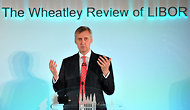Bloomberg Place, roughly the size of a Manhattan city block, is the future European home of Michael R. Bloomberg’s company and charity. But it is only one piece of the New York City mayor’s growing British empire.
He is underwriting a major expansion of one of England’s most prestigious galleries, in Kensington Gardens, designed by the noted architect Zaha Hadid.
He has the ear of London’s raffish mayor, Boris Johnson, who dispatches aides to City Hall in New York for tutelage in municipal management.
Mayor Bloomberg and his aides court the city’s elite, holding expensive dinners for tastemakers and Downing Street officials. The buzz is so great that a chief aide to Prime Minister David Cameron impishly floated the idea of a Bloomberg candidacy, for mayor of London.
As he imagines a more global life for himself after City Hall, unshackled from the 24/7 needs of running New York, Mr. Bloomberg — an Anglophile with a taste for English Regency style — is exporting his vast quantities of financial, social and political capital to this ancient city, where he has long yearned for influence.
Manhattan is home, and Bermuda a weekend escape, but no place has captured the mayor’s imagination like London, a kind of Bloomberg utopia where guns are banned, drivers pay a fee at peak hours and bicycling is a popular mode of commuting.
The affection, it turns out, is mutual: Mr. Bloomberg wrote a blurb for a book Mr. Johnson wrote. “Mike’s had a lot of cut-through in Britain,” Mayor Johnson said in an interview on a London commuter train last month. “We endlessly try to find ways of entertaining him, but generally speaking, it’s the other way around.”
Advisers to Mr. Cameron tried their own version of 311; Mr. Johnson started a volunteer program modeled after Mr. Bloomberg’s. Both have dined with the mayor on the Upper East Side.
“When I’m in New York, I’m treated like a king by Bloomberg, and it’s fantastic,” Mr. Johnson said.
Still, any foreign affair has its hiccups. Mr. Bloomberg’s attempts to install noisy air conditioners at his $20 million London home have earned the ire of neighbors, prompting local officials to call the plans “totally unacceptable.” And some of his more high-minded policies, like soda limits, have left the natives bemused.
When the mayors met for the first time, Mr. Johnson recalled, Mr. Bloomberg kept talking about trans fats.
“I didn’t know what trans fats were,” Mr. Johnson said, a glint in his eye. “I thought it had something to do with transsexuals, obese transsexuals, or something. Anyway, he made a great deal about that.”
A Gallery in the Park
Julia Peyton-Jones, the elegantly dressed director of the Serpentine Gallery in Kensington Gardens, was leading a tour last month of the newest exhibition hall when she picked up a monogrammed orange hard hat and placed it, gently, on her head.
“This is a present from Mike and Patti,” she said, smiling.
That would be Mr. Bloomberg, a lead benefactor of the expansion, and the deputy mayor who heads his charitable foundation, Patricia E. Harris. The mayor has already been offered naming rights to a room in the new gallery.
“There is no question,” Ms. Peyton-Jones said, “he’s among the most important supporters of contemporary culture in this country.”
Just as he assiduously conquered New York’s social scene, Mr. Bloomberg has, from his earliest days here, relied on parties and philanthropy to propel himself into London’s upper echelon.
He threw himself into the city’s cultural scene, joining the boards of the Serpentine and the Old Vic theater. A public relations firm was hired to make introductions in London society.
In a country where the government often financed the arts, Mr. Bloomberg adopted a more American style of corporate giving, stamping his name in museums where he paid for audio guides and sponsoring the Royal Court theater’s “Bloomberg Mondays,” when tickets were sold at a discount.
He bought a box at Ascot, the high-society horse racing grounds, and flew in celebrities by helicopter from London. (Guests received a photograph of themselves drinking Champagne with the top-hatted host.)
Article source: http://www.nytimes.com/2013/02/08/nyregion/bloomberg-builds-an-empire-in-london.html?partner=rss&emc=rss
